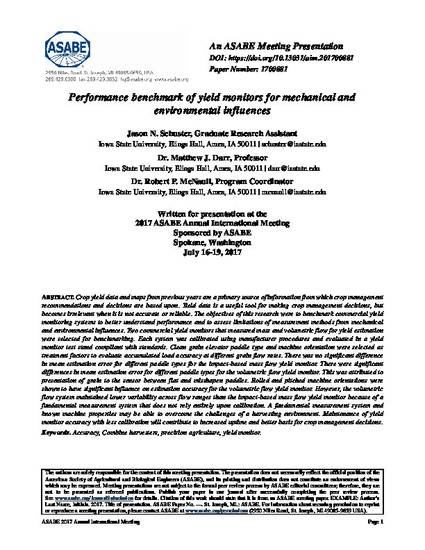
Crop yield data and maps from previous years are a primary source of information from which crop management recommendations and decisions are based upon. Yield data is a useful tool for making crop management decisions, but becomes irrelevant when it is not accurate or reliable. The objectives of this research were to benchmark commercial yield monitoring systems to better understand performance and to assess limitations of measurement methods from mechanical and environmental influences. Two commercial yield monitors that measured mass and volumetric flow for yield estimation were selected for benchmarking. Each system was calibrated using manufacturer procedures and evaluated in a yield monitor test stand compliant with standards. Clean grain elevator paddle type and machine orientation were selected as treatment factors to evaluate accumulated load accuracy at different grain flow rates. There was no significant difference in mean estimation error for different paddle types for the impact-based mass flow yield monitor. There were significant differences in mean estimation error for different paddle types for the volumetric flow yield monitor. This was attributed to presentation of grain to the sensor between flat and misshapen paddles. Rolled and pitched machine orientations were shown to have significant influence on estimation accuracy for the volumetric flow yield monitor. However, the volumetric flow system maintained lower variability across flow ranges than the impact-based mass flow yield monitor because of a fundamental measurement system that does not rely entirely upon calibration. A fundamental measurement system and known machine properties may be able to overcome the challenges of a harvesting environment. Maintenance of yield monitor accuracy with less calibration will contribute to increased uptime and better basis for crop management decisions.
Available at: http://works.bepress.com/matthew_darr/65/

This proceeding is published as Schuster, Jason N., Matthew J. Darr, and Robert P. McNaull. "Performance benchmark of yield monitors for mechanical and environmental influences." ASABE Annual International Meeting, Spokane, WA, July 16-19, 2017. DOI: 10.13031/aim.201700881. Posted with permission.